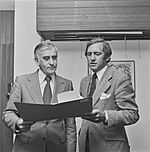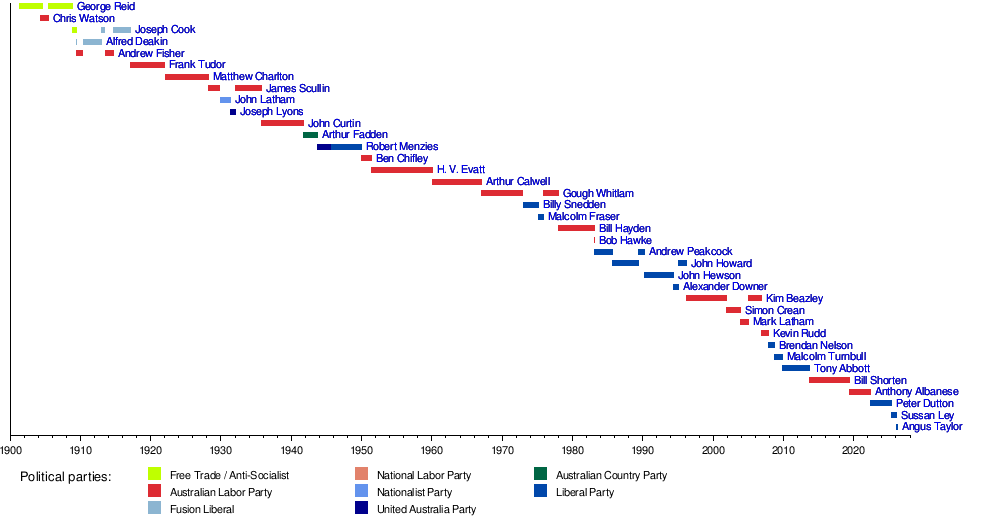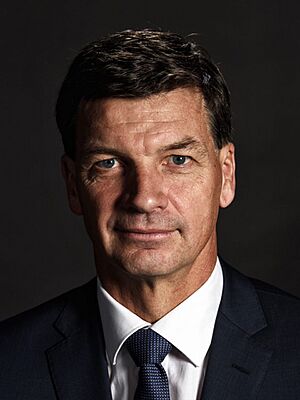Leader of the Opposition (Australia) facts for kids
Quick facts for kids Leader of the Opposition |
|
|---|---|

|
|

|
|
| Opposition of Australia Shadow Cabinet of Australia |
|
| Member of |
|
| Reports to | Parliament |
| Term length | While leader of the largest political party in the House of Representatives that is not in government |
| Inaugural holder | George Reid |
| Formation | 1901 |
| Salary | $390,000 |
In Australia's federal government, the Leader of the Opposition is an important elected official. This person is a member of parliament (MP) in the Australian House of Representatives. They lead the main opposition party. By tradition, the Leader of the Opposition is the head of the largest political party in the House of Representatives that is not currently forming the government.
When parliament meets, the opposition leader sits on the left side of the main table. They sit opposite the Prime Minister. Their party chooses the opposition leader based on its own rules. A new leader can be chosen if the current one steps down, passes away, or if someone challenges their leadership.
Australia has a constitutional monarchy and a parliamentary system. This system is similar to the one used in the United Kingdom, called the Westminster model. The "opposition" plays a key role. It questions the government's decisions and tries to show how it could do a better job. Because of this, the opposition is sometimes called the "government in waiting." It's a formal and important part of how Australia's parliament works. It opposes the government, but not the King or Queen, which is why it's called "His Majesty's Loyal Opposition."
So far, Australia has had 37 opposition leaders. 19 of these leaders later became Prime Minister.
Currently, Angus Taylor is the Leader of the Opposition. He took on this role on 13 February 2026.
Contents
What Does the Leader of the Opposition Do?
The Leader of the Opposition is like the main challenger to the Prime Minister. Their job is to lead the party that is not in power. They are expected to be ready to form a new government if the current government can no longer lead. This usually happens if the opposition party wins a federal election. After winning, the opposition leader then becomes the Prime Minister.
Sometimes, a new government might be formed if the current government loses the support of the House of Representatives. This happened in 1941. Or, if the Governor-General removed the government, as in 1975.
The opposition leader also leads the shadow ministry. This is a group of opposition members who "shadow" each government minister. They learn about those government departments. The opposition leader chooses who gets which "shadow" job. There is also a Deputy Leader of the Opposition. This person helps the leader and gets an extra salary. Both the leader and deputy leader receive special attention from the Speaker of the House.
The role of the opposition leader is not written in Australia's Constitution. Instead, it exists because of long-standing traditions in the Westminster system. In 1960, a study about parliamentary salaries noted how important this role is. It said the opposition leader must understand all the issues before parliament. They must be quick to respond and always active. They help guide public opinion on important policy matters.
A Look Back: The History of the Role

George Reid was the first unofficial Leader of the Opposition. This was before the first federal election in 1901. He took on this role after Edmund Barton became Australia's first Prime Minister. Reid's position was confirmed when the House of Representatives met for the first time.
At first, the opposition leader did not get any extra salary or benefits. They only received what a regular member of parliament got. Because of this, George Reid had to keep working as a lawyer in Sydney. He could only attend about one-third of the parliament's meetings in its first session.
Even though the role was clearly there, the House of Representatives didn't officially write it down until 1920. It was legally recognized for the first time with a law called the Parliamentary Allowances Act 1920. This law gave the opposition leader an extra allowance (money). Earlier, in 1910, Prime Minister Andrew Fisher offered Opposition Leader Alfred Deakin an allowance. Deakin said no, but he did accept a paid secretary. In 1931, the role was added to the House's standing orders. This gave the opposition leader the right to speak for longer than usual in some cases.
How Much Does the Leader of the Opposition Earn?
An independent group called the Remuneration Tribunal decides the opposition leader's salary. As of 1 July 2019, the person in this role receives a base salary of about A$211,250. They also get an extra 85% on top of that. This means their total salary is around $390,000 per year.
List of Leaders of the Opposition
| No. | Leader | Party | Constituency | Took office | Left office | Prime Minister | Ref | |||
|---|---|---|---|---|---|---|---|---|---|---|
| 1 | George Reid |  |
Free Trade | East Sydney (NSW) | 19 May 1901 | 17 August 1904 | Barton 1901–03 | |||
| Deakin 1903–04 | ||||||||||
| Watson 1904 | ||||||||||
| 2 | Chris Watson |  |
Labor | Bland (NSW) | 18 August 1904 | 5 July 1905 | Reid 1904–05 | |||
| (1) | George Reid |  |
Free Trade / Anti-Socialist | East Sydney (NSW) | 7 July 1905 | 16 November 1908 | Deakin 1905–08 | |||
| Fisher 1908–09 | ||||||||||
| 3 | Joseph Cook |  |
Anti-Socialist | Parramatta (NSW) | 17 November 1908 | 26 May 1909 | ||||
| 4 | Alfred Deakin |  |
Liberal | Ballaarat (Vic) | 26 May 1909 | 2 June 1909 | ||||
| 5 | Andrew Fisher |  |
Labor | Wide Bay (Qld) | 2 June 1909 | 29 April 1910 | Deakin 1909 | |||
| (4) | Alfred Deakin |  |
Liberal | Ballaarat (Vic) | 1 July 1910 | 20 January 1913 | Fisher 1910–13 | |||
| (3) | Joseph Cook |  |
Parramatta (NSW) | 20 January 1913 | 24 June 1913 | |||||
| (5) | Andrew Fisher |  |
Labor | Wide Bay (Qld) | 8 July 1913 | 17 September 1914 | Cook 1913–14 | |||
| (3) | Joseph Cook |  |
Liberal | Parramatta (NSW) | 8 October 1914 | 17 February 1917 | Fisher 1914–15 | |||
| Hughes 1915–23 | ||||||||||
| 6 | Frank Tudor |  |
Labor | Yarra (Vic) | 17 February 1917 | 10 January 1922 | ||||
| 7 | Matthew Charlton |  |
Hunter (NSW) | 25 January 1922 | 29 March 1928 | |||||
| Bruce 1923–29 | ||||||||||
| 8 | James Scullin |  |
Yarra (Vic) | 29 March 1928 | 22 October 1929 | |||||
| 9 | John Latham |  |
Nationalist | Kooyong (Vic) | 20 November 1929 | 7 May 1931 | Scullin 1929–32 | |||
| 10 | Joseph Lyons |  |
United Australia | Wilmot (Tas) | 7 May 1931 | 6 January 1932 | ||||
| (8) | James Scullin |  |
Labor | Yarra (Vic) | 6 January 1932 | 1 October 1935 | Lyons 1932–39 | |||
| 11 | John Curtin |  |
Fremantle (WA) | 1 October 1935 | 7 October 1941 | |||||
| Page 1939 | ||||||||||
| Menzies 1939–41 | ||||||||||
| Fadden 1941 | ||||||||||
| 12 | Arthur Fadden |  |
Country | Darling Downs (Qld) | 7 October 1941 | 23 September 1943 | Curtin 1941–45 | |||
| 13 | Robert Menzies |  |
United Australia | Kooyong (Vic) | 23 September 1943 | 19 December 1949 | ||||
| Liberal | Forde 1945 | |||||||||
| Chifley 1945–49 | ||||||||||
| 14 | Ben Chifley |  |
Labor | Macquarie (NSW) | 19 December 1949 | 13 June 1951 | Menzies 1949–66 | |||
| 15 | H. V. Evatt |  |
Barton (NSW) 1940–58 Hunter (NSW) 1958–60 |
20 June 1951 | 9 February 1960 | |||||
| 16 | Arthur Calwell |  |
Melbourne (Vic) | 7 March 1960 | 8 February 1967 | |||||
| Holt 1966–67 | ||||||||||
| 17 | Gough Whitlam |  |
Werriwa (NSW) | 8 February 1967 | 2 December 1972 | |||||
| McEwen 1967–68 | ||||||||||
| Gorton 1968–71 | ||||||||||
| McMahon 1971–72 | ||||||||||
| 18 | Billy Snedden |  |
Liberal | Bruce (Vic) | 20 December 1972 | 21 March 1975 | Whitlam 1972–75 | |||
| 19 | Malcolm Fraser |  |
Wannon (Vic) | 21 March 1975 | 11 November 1975 | |||||
| (17) | Gough Whitlam |  |
Labor | Werriwa (NSW) | 11 November 1975 | 22 December 1977 | Fraser 1975–83 | |||
| 20 | Bill Hayden |  |
Oxley (Qld) | 22 December 1977 | 8 February 1983 | |||||
| 21 | Bob Hawke |  |
Wills (Vic) | 8 February 1983 | 11 March 1983 | |||||
| 22 | Andrew Peacock |  |
Liberal | Kooyong (Vic) | 11 March 1983 | 5 September 1985 | Hawke 1983–91 | |||
| 23 | John Howard |  |
Bennelong (NSW) | 5 September 1985 | 9 May 1989 | |||||
| (22) | Andrew Peacock |  |
Kooyong (Vic) | 9 May 1989 | 3 April 1990 | |||||
| 24 | John Hewson |  |
Wentworth (NSW) | 3 April 1990 | 23 May 1994 | |||||
| Keating 1991–96 | ||||||||||
| 25 | Alexander Downer |  |
Mayo (SA) | 23 May 1994 | 30 January 1995 | |||||
| (23) | John Howard |  |
Bennelong (NSW) | 30 January 1995 | 11 March 1996 | |||||
| 26 | Kim Beazley |  |
Labor | Brand (WA) | 19 March 1996 | 22 November 2001 | Howard 1996–07 | |||
| 27 | Simon Crean |  |
Hotham (Vic) | 22 November 2001 | 2 December 2003 | |||||
| 28 | Mark Latham |  |
Werriwa (NSW) | 2 December 2003 | 18 January 2005 | |||||
| (26) | Kim Beazley |  |
Brand (WA) | 28 January 2005 | 4 December 2006 | |||||
| 29 | Kevin Rudd |  |
Griffith (Qld) | 4 December 2006 | 3 December 2007 | |||||
| 30 | Brendan Nelson |  |
Liberal | Bradfield (NSW) | 3 December 2007 | 16 September 2008 | Rudd 2007–10 | |||
| 31 | Malcolm Turnbull |  |
Wentworth (NSW) | 16 September 2008 | 1 December 2009 | |||||
| 32 | Tony Abbott |  |
Warringah (NSW) | 1 December 2009 | 18 September 2013 | |||||
| Gillard 2010–13 | ||||||||||
| Rudd 2013 | ||||||||||
| 33 | Bill Shorten |  |
Labor | Maribyrnong (Vic) | 13 October 2013 | 30 May 2019 | Abbott 2013–15 | |||
| Turnbull 2015–18 | ||||||||||
| Morrison 2018–22 | ||||||||||
| 34 | Anthony Albanese |  |
Grayndler (NSW) | 30 May 2019 | 23 May 2022 | |||||
| 35 | Peter Dutton |  |
Liberal | Dickson (Qld) | 30 May 2022 | 3 May 2025 | Albanese 2022– | |||
| 36 | Sussan Ley |  |
Farrer (NSW) | 13 May 2025 | 13 February 2026 | |||||
| 37 | Angus Taylor |  |
Hume (NSW) | 13 February 2026 | Incumbent | |||||
Timeline of Leaders

List of Deputy Leaders of the Opposition
| Deputy Leader | Party | Constituency | Took office | Left office | Leader | Ref | |||
|---|---|---|---|---|---|---|---|---|---|
| Joseph Cook |  |
Commonwealth Liberal Party | Parramatta (NSW) | 26 May 1909 | 2 June 1909 | Deakin 1909 | |||
| Gregor McGregor |  |
Labor Party | Senator for South Australia (SA) | 2 June 1909 | 29 April 1910 | Fisher 1909–10 | |||
| Joseph Cook |  |
Commonwealth Liberal Party | Parramatta (NSW) | 1 July 1910 | 20 January 1913 | Deakin 1910–13 | |||
| Sir John Forrest |  |
Swan (WA) | 20 January 1913 | 24 June 1913 | Cook 1913 | ||||
| Gregor McGregor |  |
Labor Party | Senator for South Australia (SA) | 8 July 1913 | 7 September 1914 | Fisher 1913–14 | |||
| Sir John Forrest |  |
Commonwealth Liberal Party | Swan (WA) | 8 October 1914 | 17 February 1917 | Cook 1914–17 | |||
| Albert Gardiner |  |
Labor Party | Senator for New South Wales (NSW) | 17 February 1917 | March 1927 | Tudor 1917–22 | |||
| Charlton 1922–28 | |||||||||
| James Scullin |  |
Yarra (Vic) | 17 March 1927 | 29 March 1928 | |||||
| Arthur Blakeley |  |
Darling (NSW) | 29 March 1928 | 1929 | Scullin 1928–29 | ||||
| Ted Theodore |  |
Dalley (NSW) | 1929 | 22 October 1929 | |||||
| Henry Gullett |  |
Nationalist Party | Henty (Vic) | 20 November 1929 | 7 May 1931 | Latham 1929–31 | |||
| John Latham |  |
United Australia Party | Kooyong (Vic) | 7 May 1931 | 6 January 1932 | Lyons 1931–32 | |||
| Frank Forde |  |
Labor Party | Capricornia (Qld) | 7 January 1932 | 7 October 1941 | Scullin 1932–35 | |||
| Curtin 1935–41 | |||||||||
| Billy Hughes |  |
United Australia Party | North Sydney (NSW) | 9 October 1941 | 14 April 1944 | Fadden 1941–43 | |||
| Menzies 1943–49 | |||||||||
| Eric Harrison |  |
Wentworth (NSW) | 14 April 1944 | 19 December 1949 | |||||
| Liberal Party | |||||||||
| H. V. Evatt |  |
Labor Party | Barton (NSW) | 19 December 1949 | 13 June 1951 | Chifley 1949–51 | |||
| Arthur Calwell |  |
Melbourne (Vic) | 13 June 1951 | 9 February 1960 | Evatt 1951–60 | ||||
| Gough Whitlam |  |
Werriwa (NSW) | 7 March 1960 | 8 February 1967 | Calwell 1960–67 | ||||
| Lance Barnard |  |
Bass (Tas) | 8 February 1967 | 5 December 1972 | Whitlam 1967–72 | ||||
| Phillip Lynch |  |
Liberal Party | Flinders (Vic) | 20 December 1972 | 11 November 1975 | Snedden 1972–75 | |||
| Fraser 1975 | |||||||||
| Frank Crean |  |
Labor Party | Melbourne Ports (Vic) | 11 November 1975 | 22 December 1975 | Whitlam 1975–77 | |||
| Tom Uren |  |
Reid (NSW) | 22 December 1975 | 22 December 1977 | |||||
| Lionel Bowen |  |
Kingsford Smith (NSW) | 22 December 1977 | 11 March 1983 | Hayden 1977–83 | ||||
| Hawke 1983 | |||||||||
| John Howard |  |
Liberal Party | Bennelong (NSW) | 11 March 1983 | 5 September 1985 | Peacock 1983–85 | |||
| Neil Brown |  |
Menzies (Vic) | 5 September 1985 | 17 July 1987 | Howard 1985–89 | ||||
| Andrew Peacock |  |
Kooyong (Vic) | 17 July 1987 | 9 May 1989 | |||||
| Fred Chaney |  |
Senator for Western Australia (WA) 1989–90 Pearce (WA) 1990 |
9 May 1989 | 3 April 1990 | Peacock 1989–90 | ||||
| Peter Reith |  |
Flinders (Vic) | 3 April 1990 | 23 March 1993 | Hewson 1990–94 | ||||
| Michael Wooldridge |  |
Chisholm (Vic) | 23 March 1993 | 23 May 1994 | |||||
| Peter Costello |  |
Higgins (Vic) | 23 May 1994 | 11 March 1996 | Downer 1994–95 | ||||
| Howard 1995–96 | |||||||||
| Gareth Evans |  |
Labor Party | Holt (Vic) | 19 March 1996 | 19 October 1998 | Beazley 1996–2001 | |||
| Simon Crean |  |
Hotham (Vic) | 19 October 1998 | 22 November 2001 | |||||
| Jenny Macklin |  |
Jagajaga (Vic) | 22 November 2001 | 18 September 2006 | Crean 2001–03 | ||||
| Latham 2003–05 | |||||||||
| Beazley 2005–06 | |||||||||
| Julia Gillard |  |
Lalor (Vic) | 4 December 2006 | 3 December 2007 | Rudd 2006–07 | ||||
| Julie Bishop |  |
Liberal Party | Curtin (WA) | 3 December 2007 | 18 September 2013 | Nelson 2007–08 | |||
| Turnbull 2008–09 | |||||||||
| Abbott 2009–13 | |||||||||
| Tanya Plibersek |  |
Labor Party | Sydney (NSW) | 14 October 2013 | 30 May 2019 | Shorten 2013–19 | |||
| Richard Marles |  |
Corio (Vic) | 30 May 2019 | 23 May 2022 | Albanese 2019–22 | ||||
| Sussan Ley |  |
Liberal Party | Farrer (NSW) | 30 May 2022 | 13 May 2025 | Dutton 2022–25 | |||
| Ted O'Brien |  |
Fairfax (Qld.) | 13 May 2025 | 13 February 2026 | Ley 2025–26 | ||||
| Jane Hume |  |
Liberal Party | Senator for Victoria (VIC) | 13 February 2026 | Incumbent | Taylor 2026 | |||
See also
 In Spanish: Líder de la oposición (Australia) para niños
In Spanish: Líder de la oposición (Australia) para niños
- List of prime ministers of Australia
- Politics of Australia
 | Valerie Thomas |
 | Frederick McKinley Jones |
 | George Edward Alcorn Jr. |
 | Thomas Mensah |


